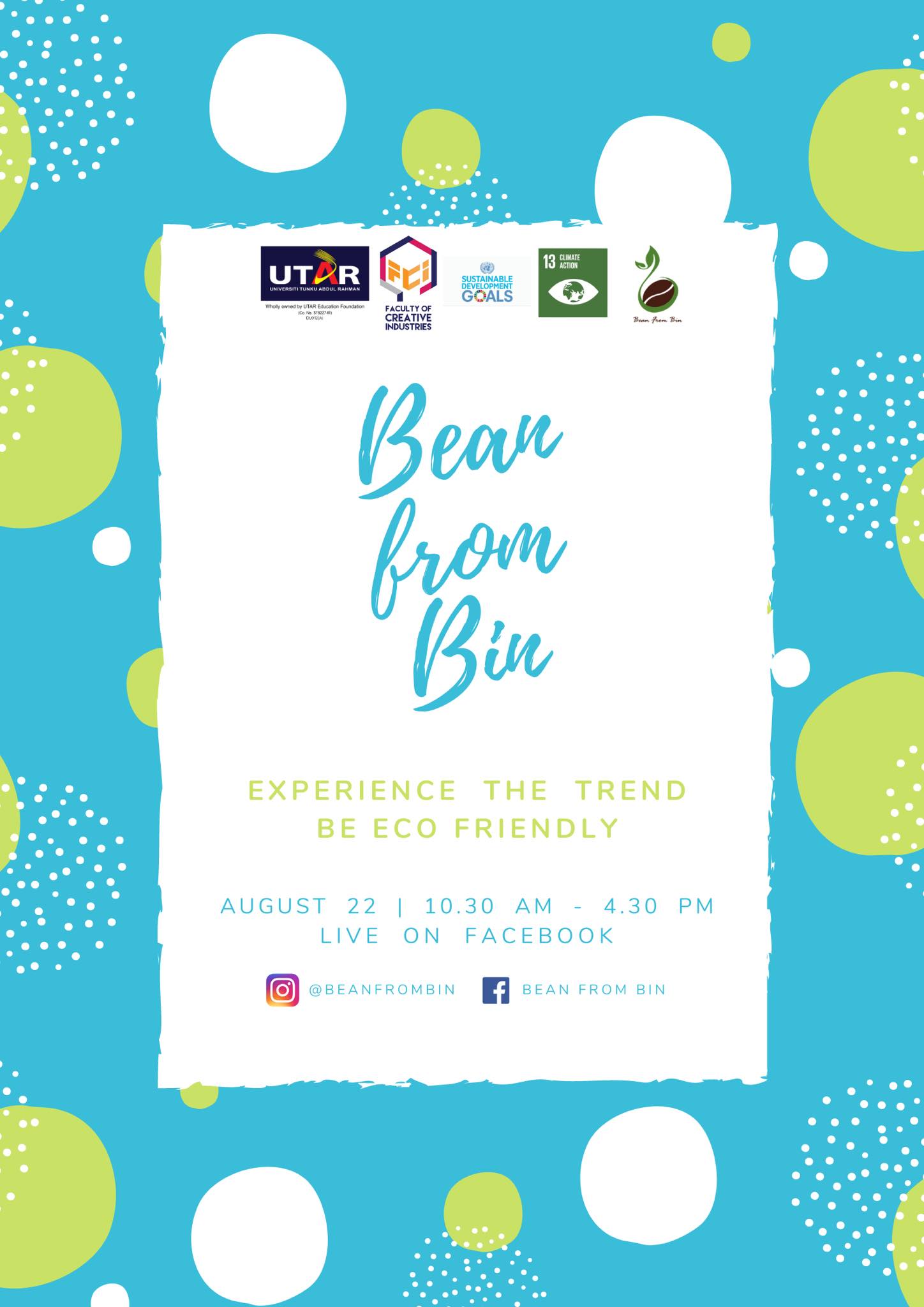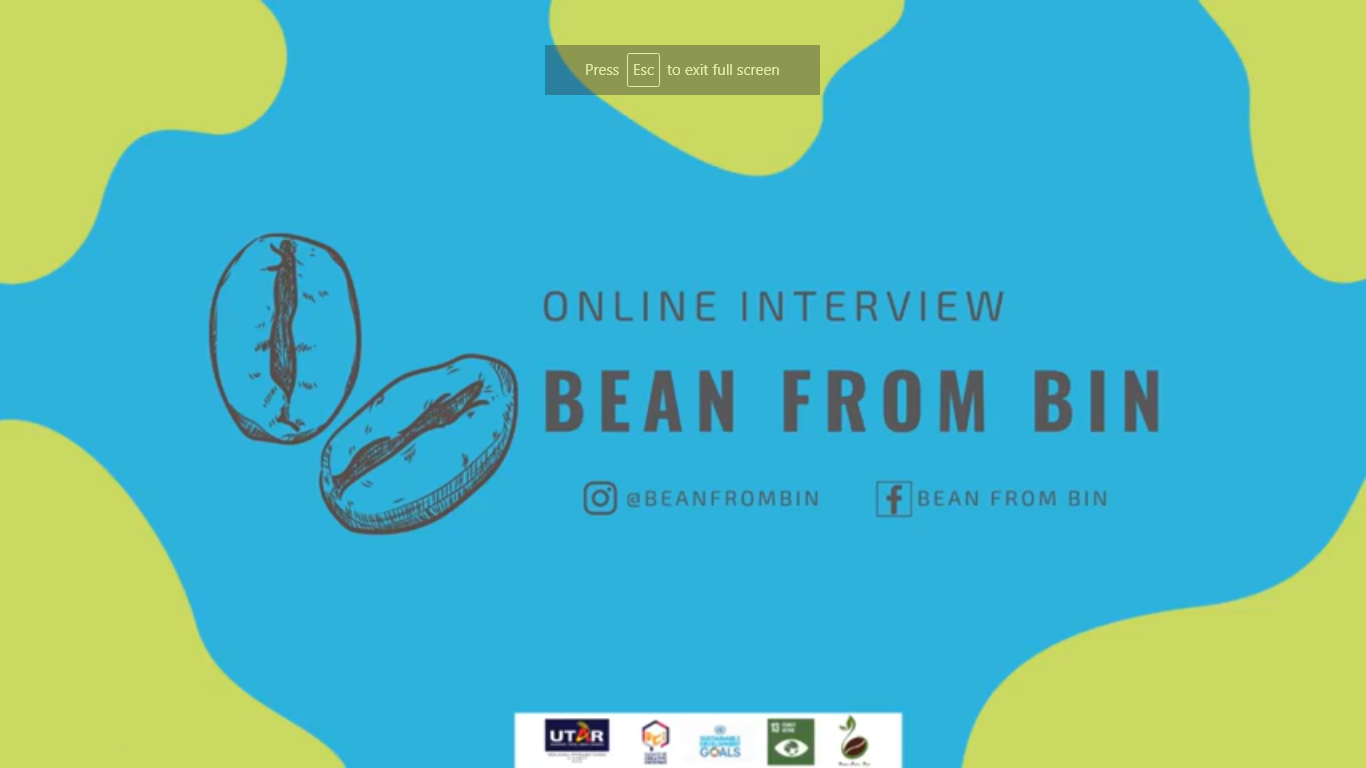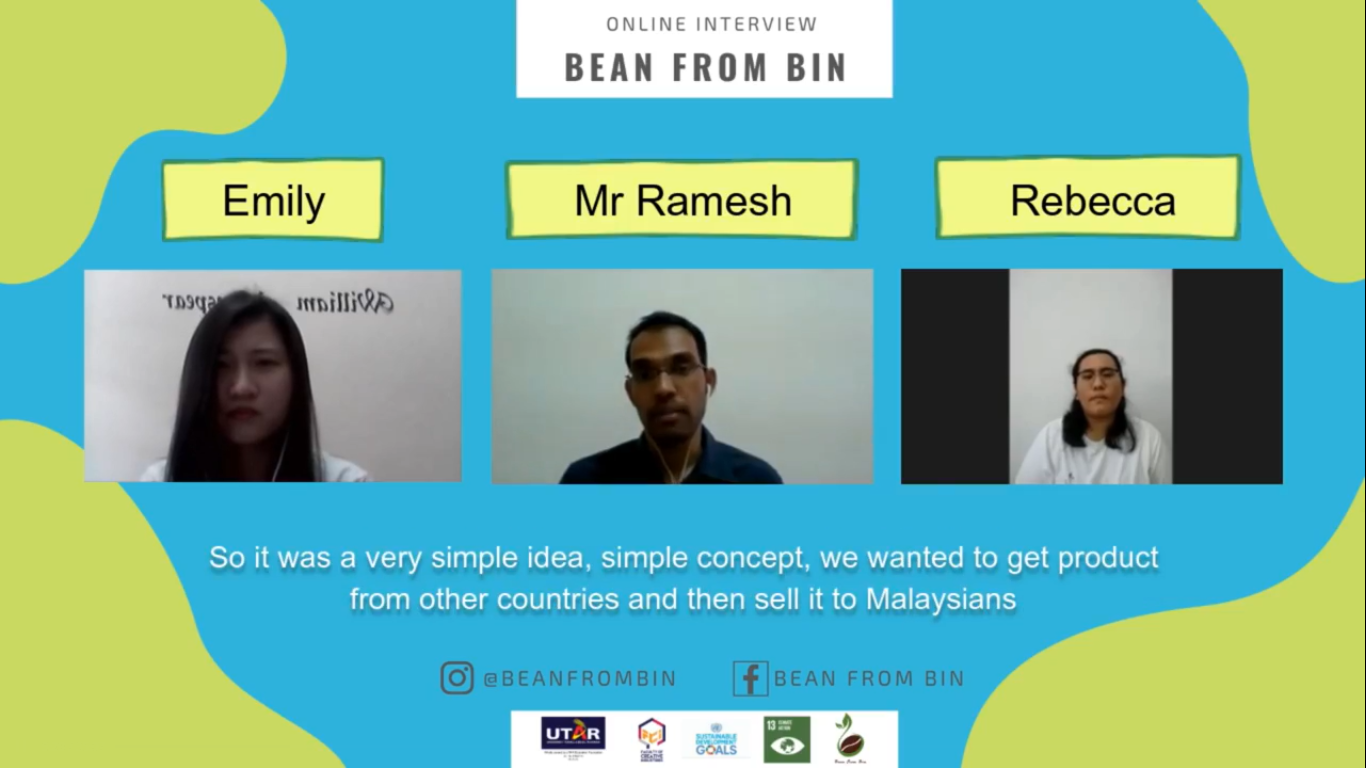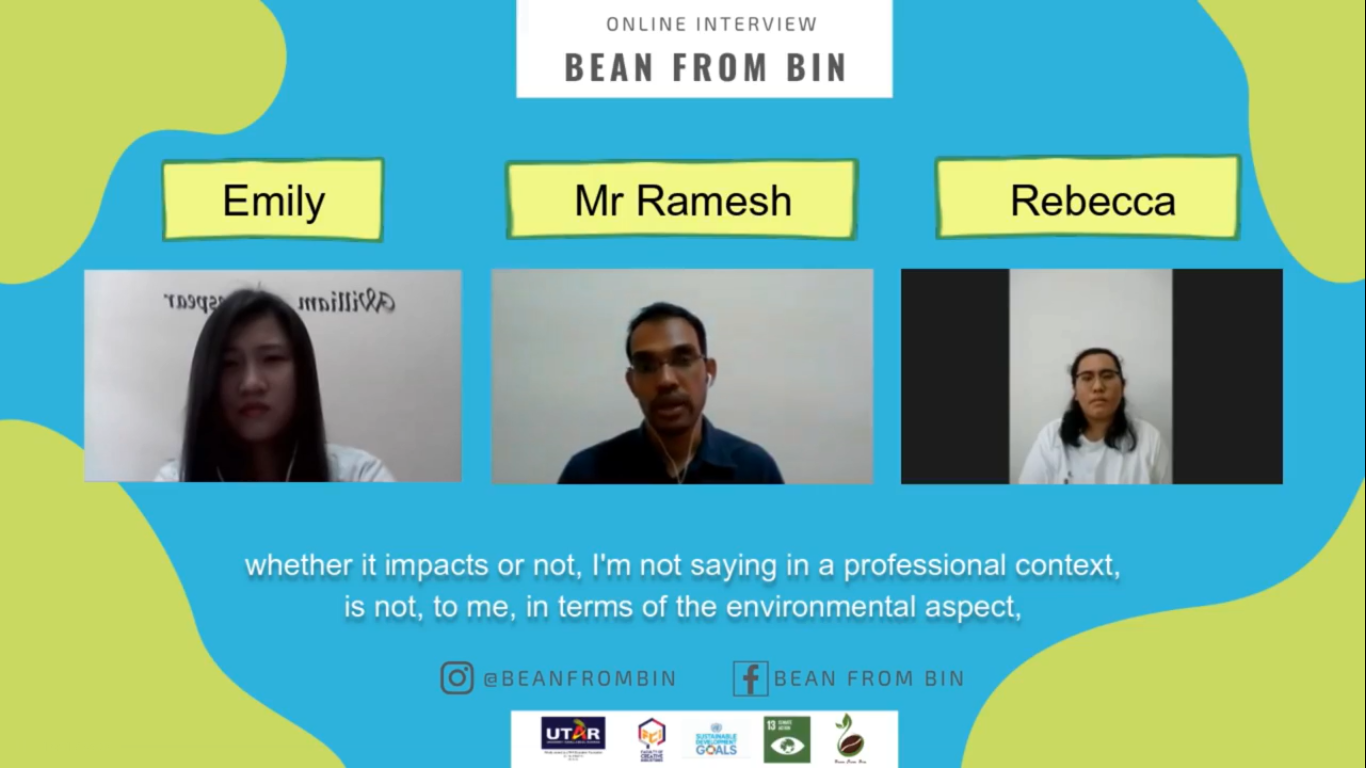

The official poster of Bean from Bin
The used coffee grounds release harmful greenhouse
gases such as “methane” when it is not disposed properly. The impact of
these gases could severely damage the ozone layer. Thus, the Corporate
Communication Final Year students organised an online sustainability
campaign titled “Bean from Bin” via Facebook on 22 August 2020. Initiated as
part of their final year project (FYP), Bean from Bin aimed to recycle
coffee grounds and increase the awareness of the harms of coffee ground to
the environment as well as to create a more sustainable future for all by
educating the public on the usage of recycled coffee grounds. The project is
aligned with the 13th Sustainable Development Goal which is to
take urgent action to combat climate change and its impacts.
Throughout the campaign, online fundraising events, educational talks and virtual workshops were conducted whereby participants got to learn about the proper methods of reusing coffee grounds such as turning it into coffee body scrub and baking desserts, and ways to dispose coffee grounds.
The event was made possible with the support from their official sponsor Yayasan Hasanah, official partner Amitie Cafe Sungai Long and speaker, Ramesh Sinniah, the co-founder of Auresso Coffee Sdn Bhd (Auresso). On 22 August 2020, the students had a sharing session with him, where he talked about his experience working in the coffee industry and his view towards coffee waste management in today’s society. The session was moderated by Organising Chairperson Emily Ho and Head of FYP Programme Rebecca Sinaga.

Bean from Bin sharing session
He first shared the history of Auresso and told what
inspired him to start Auresso. “Somewhere around 2010 to 2011, there was a
lack of coffee beans supply in the Malaysian market. For the record, there
are various types of coffee beans. However, I realised that other countries
were using different beans from Malaysia when I visited Australia. Since
Malaysians often use Robusta beans, the idea and concept of Auresso for the
first few years was simple; we imported the products (coffee beans) from
other countries and sold it to Malaysians through our website for home users
and offline channels for wholesale purposes. All because of the lack of
supply for high-quality coffee beans in the Malaysian market,” said Ramesh.
He then told a summary of how his business works, “Now we have expanded our
business to not just selling coffee, but also products like chocolate and
matcha. We also worked together with the local roasters to have our own
products and brands, coffee and coffee beans branded in our own packaging.”
Emily Ho then asked Ramesh how he keeps Auresso
afloat with so many other cafes opening, to which he replied, “It is getting
harder, since many of the new businesses in this industry are doing
something similar to us, and these competitors mostly consist of local
coffee roasters. So, to counter this problem, we stopped working with
foreign roasters and started to develop our own in-house brand. Not just
that, most of our competitors use and sell specific products such as coffee
beans; however, we have a wide range of products and options for our
customers to choose from. Ranging from products such as teas and chocolate
powders to coffee machines and even consultation for the industry newcomers,
we have an edge over our competitors, which is the diversification of
products.”
Next, he explained the challenges Auresso faced
during the Movement Control Order (MCO). He admitted that the company had
troubles coping with it and faced a decrease in sales. In order for the
company to deal with the crisis, they had to relocate their main office and
reduce expenses. Furthermore, Ramesh made the smart move of emphasising the
company’s effort on online sales. They expanded their business to online
platforms such as Shopee and Lazada, as during this period, the e-commerce
industry was blooming and they decided to exploit this opportunity.

Ramesh sharing the history of Auresso
The two moderators then directed the burning
questions to Ramesh, “Does coffee waste really impact the environment? Could
you also share with us about the industry when it comes to coffee waste
management?”. Ramesh took no time to respond to the questions. Sharing his
point of view, he said, “In sense of business, having an abundance of coffee
waste is a good problem because the more coffee is consumed, the more waste
there is. The waste I am referring to is the coffee grounds extracted from
the machine after brewing, which is later thrown out. So if a café is
producing a lot of coffee grounds, it is a good problem. In my opinion,
coffee grounds do not have a huge impact on the environment because coffee
grounds are actually organic plant matters that decompose over time. When
coffee grounds get thrown into the trash, it eventually goes to the
landfills, decomposes there and turns into rich soil.” Nonetheless, he
expressed his disappointment that it is a waste of resource because it goes
to the landfill without being used. Speaking of this, he said, “These coffee
grounds are not being utilised because high producing cafes make a lot of
coffee, creating more of these waste, and it inevitably ends up in the
landfill. The waste also gets mouldy easily, since high-pressure water is
used when making the coffee. We still do not have the processing methods or
technologies to use mouldy coffee grounds.”

Ramesh speaking with Rebecca and Emily
Ho on coffee bean waste
Following on from the previous question, Ramesh was
asked to share some ways to reduce coffee bean waste efficiently. “You
cannot reduce coffee grounds, since it might affect your sales. Using fewer
coffee grounds means producing less coffee. However, unused coffee grounds
are a different matter altogether, as it can and should be reduced. Unused
coffee grounds are those not used in making the coffee. This is one of the
biggest problems in the industry. Why? Because a lot of cafes restaurants
that have coffee machines do not have skilled baristas to handle them. The
techniques used to make optimal coffee and espresso shot vary drastically
among well-skilled to poorly skilled baristas, and this affects the amount
of coffee grounds as well. When calibrating the grinder, some coffee beans
are flushed out. Thus, those baristas who are good at calibrating the
grinder can do it with minimal coffee grounds wastage, while those poorly
skilled and less knowledgeable might waste a lot,” said Ramesh. He added
another point, saying, “The machines used can also affect the amount of
coffee ground waste, and choosing the right machine and grinder play an
important role in reducing it. Moreover, we here at Auresso try to educate
the clients about proper stock management because it keeps them from buying
too much coffee. Many businesses do not know about good stock management and
buy lots of coffee beans at once, thinking it will sustain them for a long
time. Little do they know that the coffee beans age, and when using older
beans, a higher volume is needed to make coffee, that is to say, it leads to
an increase in coffee grounds or waste.”
Lastly, he was asked if the businesses in this
industry would adapt to the recycling lifestyle in the long run, to which he
replied that it would if enough awareness was given. He noted that a lot of
materials were already being recycled with help from individual and NGOs,
and also because there is a demand for it. Ramesh finished it off, saying,
“At the moment there is too much coffee waste being produced and not enough
need to sustain the volume. If the awareness among society and business is
built and research about coffee beans is done, then there would surely be an
increase in the recycling of coffee bean waste.”
Rebecca and Emily Ho concluded the session by
thanking Ramesh and briefly explaining how people especially coffee lovers,
can recycle their coffee waste. For instance, they can use it as a natural
deodorizer or fertilizer.
![]()
![]()
Wholly owned by UTAR Education Foundation Co. No. 578227-M LEGAL STATEMENT TERM OF USAGE PRIVACY NOTICE